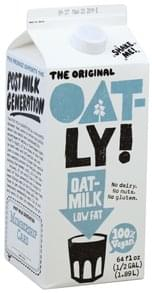Oatmilk is a popular dairy alternative that is made from oats and water. It is a great option for those who are lactose intolerant or have a dairy allergy. Oatmilk is naturally sweet and has a creamy texture, making it a delicious addition to coffee, cereal, or smoothies.
From a nutritional standpoint, oatmilk is low in saturated fat and cholesterol, making it a heart-healthy choice. It is also a good source of fiber, which can help aid digestion and keep you feeling full longer. Oatmilk is fortified with vitamins and minerals, such as calcium and vitamin D, to help support bone health.
Oatmilk Nutrition Information
Oatmilk Nutrition Facts
One cup of oatmilk typically contains around 130 calories, 2.5 grams of fat, 2 grams of protein, and 2 grams of fiber. It is also a good source of iron, magnesium, and potassium. Oatmilk is naturally sweetened with oats, so there is no need for added sugars.
Compared to cow’s milk, oatmilk is lower in calories and fat, making it a great option for those looking to reduce their intake of saturated fats. Oatmilk is also free of lactose and soy, making it a suitable choice for those with dietary restrictions.
How to Incorporate Oatmilk Into Your Diet
There are many ways to incorporate oatmilk into your diet. You can use it as a dairy alternative in your morning coffee or cereal, or blend it into smoothies for a creamy texture. Oatmilk can also be used in baking as a substitute for cow’s milk in recipes.
When choosing oatmilk, be sure to look for options that are fortified with vitamins and minerals to ensure you are getting the most nutritional benefits. Oatmilk can be found in most grocery stores, typically in the refrigerated or non-dairy milk section.
